
The first #stickerwoman?
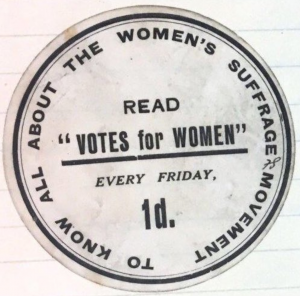
The first #stickerwoman?
On the morning of 22 April 1910, 20 year old Londoner Vera Wentworth pasted eight stickers on the Palace of Westminster walls. The stickers read: ‘To know more about the Women’s Suffrage Movement read “Votes for Women” Every Friday, 1d.”
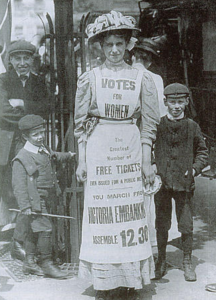
Vera Wentworth
Born Jessie Alice Spink, she changed her name in her teens, possibly to save her parents the embarrassment of association. A member of the secret direct action group ‘Young Hot Bloods’ she spent several months in prison, being arrested seven times and force fed four.
In 1909 Vera and her friend Elsie Howie interrupted a meeting at Colston Hall in Bristol, astonishing a cabinet minister and his audience when loud cries of “Votes for Women!” came from the organ within the hall during his speech. In order to pull off this stunt, the young women had to hide in the organ overnight. On another occassion, Wentworth smashed the windows of Bristol’s Liberal Club just before Churchill was due to speak.
Vera, Elsie and Jessie Kennedy shocked many high-profile women in the movement by assaulting Prime Minister Asquith and Gladstone (the Home Secretary) while they were playing golf. Emily Blathwayt was horrified and wrote of Vera and Elsie in her diary: “We hear of terrible things by the two Hooligans.”
Was Vera the first British #stickerwoman? I like to think she was. Described by writer Rebecca West as ‘a first rate speaker… a little terror… rather a handsome girl’ she was certainly a character and she took no shit from anyone.
#FemmeDesAutocollants – the French connection

This evening I watched Catherine Corsini’s film ‘Summertime’ (La Belle Saison) in which soon-to-be-lovers Carole and Delphine sticker statues and public buildings as part of feminist protests in 1970s Paris.
The Mouvement de Libération des Femmes (MLF) was formed in 1970 to advocate for a woman’s right to contraception and abortion. Carole’s stickers read, “chaque année, plus que 1 million prennent le risque‘, a reference to the estimated one million women who underwent illegal abortions each year in the 70s.
“(In France) those who could afford to went to private clinics or to doctors abroad, but the vast majority of women took their chances on kitchen tables and back-alley offices, at the wire hangers of the faiseuses d’anges,” observed Jess McHugh in Time Magazine (2018).

Simone Veil
In 1974 France’s Health Minister, Simone Veil, presented a law that would legalize abortion to the (98% male) National Assembly. Veil, a survivor of the Nazi concentration camps, received threats and verbal abuse for this action; she was accused of murdering innocent babies and swastikas were drawn on the walls of her apartment building.
In 1975 France legalized abortion (Law 75-17) up to ten weeks. In that year over 45,000 legal abortions were performed. In 2001 the time limit was extended to 12 weeks. An attempt to increase this to 14 weeks in 2019 failed.
 Perhaps it is hard for those of us who have grown up with free and relatively easy access to contraception and abortion in the UK to imagine the lack of bodily autonomy of our mothers or grandmothers and those before them.
Perhaps it is hard for those of us who have grown up with free and relatively easy access to contraception and abortion in the UK to imagine the lack of bodily autonomy of our mothers or grandmothers and those before them.
So why am I writing about French politics and cinematography in an article about British feminism?
Well, in the words of Marie-Jo Bonnet of MLF, “Women’s bodies are our territory, and it’s a territory that has been colonised by the power of men.”
This colonisation of women’s bodies is now happening in a new way, this time by men who are demanding that we recognise them as women. You and I live in a world when women cannot name themselves, cannot name their bodies as the root of their oppression, where we cannot speak about our sex-based rights and our sex-based needs without being threatened, bullied and doxxed into silence with the magical words ‘TERF‘ and ‘transphobe’.
Just think! Seriously. You and I live in a world where to speak the words ‘women don’t have penises’ or ‘a woman is an adult human female’ or ‘only women give birth to babies’ are acts of rebellion with potentially serious consequences.
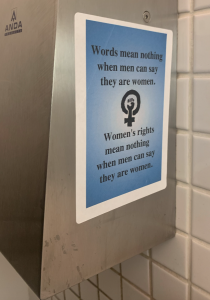 So the activism of the characters in La Belle Saison and the work of women like Veil and Bonnet is hugely relevant because behind the seemingly casual rebelliousness of the acts of #stickerwoman stands the very serious and ongoing battle for women’s rights.
So the activism of the characters in La Belle Saison and the work of women like Veil and Bonnet is hugely relevant because behind the seemingly casual rebelliousness of the acts of #stickerwoman stands the very serious and ongoing battle for women’s rights.
Woman is not a feeling in a man’s head.
To quote Marie-Jo Bonnet one more time: “It is an emancipation. We are taking back the power of our own lives.”
We are all #stickerwoman.
The Rise of #Stickerwoman

Probably the first stickers to really grab public attention in recent years were the ‘women don’t have penises’ stickers. The first design was by Venice Allan, who shared her template with others, and variations sprung up around the country.
“I was originally inspired by Jacqueline of the Untameable Shrews.” Venice told me.
“What I loved about the ‘Shrews’ was that they were about sharing sticker templates that women could print out for themselves, rather than just selling stickers.”
The Untameable Shrews was an international radical feminist art collective, started in Australia in 2016. As well involvement in stickering and graffitti actions and sharing free templates on social media, the Untameable Shrews (sometimes spelled untamable shrews) ran an Etsy shop- until it was banned. In 2017 their facebook account was suspended. Their Twitter account followed shortly afterwards and their Tumblr and Instagram accounts are now also both closed. It looks as if you may still be able to buy some of their designs on redbubble.


The Untameable Shrews were still active in London and in other parts of the UK in 2018: I spotted one of their stickers at a bus stop in Kensington in late summer that year. When it was still there in November I shared a photo on Twitter.
The Shrews were not only international stickering pioneers they also inspired quite possibly the most iconic sticker action of all – the ‘penis stickers’.
The 2018 campaigns began in the climate of potential reform of the 2004 Gender Recognition Act (GRA). Changes were being suggested that meant the act would encompass ‘self ID’, meaning that any man must be ‘treated like’ a woman just on his say-so that he was a woman. This would have allowed any man easy access to women’s spaces such as changing rooms, public toilets and refuges: all he would have to do is declare himself to be a woman.
You can find out more about Equality Law and the GRA here, here and here.
These potential changes were at the heart of many of the stickering campaigns which arose, protesting against law changes which would enable men to enter female spaces without even having a Gender Recognition Certificate. As more and more women woke up to the idea that the very words we used to describe ourselves were being snatched away before our eyes, and that our safety and privacy would be further compromised if these changes took place, we looked around for things we could do.
“GRA-reformers stomped hard on dissent. Even asking how trans rights and women’s protections could be reconciled was dubbed bigotry.“ reported Janice Turner in last week’s ‘Times’ “So grassroots feminist groups formed to defend sex-based rights…”
Groups like Man Friday and Fair Play for Women sprung up to draw attention to the unfairness and absurdity of these changes. Some of us wrote to our MPs; some attended meetings, others wrote articles. Some were active on social media, others spoke to friends and family. Some gave money to fund campaigns, some handed out leaflets or spoke in public. There were billboards and banners and marches and protests… and then there were stickers.
Women don’t have penises
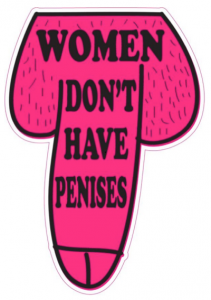 Back in early 2018, campaigns and feminist groups were springing up all over the country, seeking to educate the public about the very real erosion of female rights which would arise if changes to the Act went through.
Back in early 2018, campaigns and feminist groups were springing up all over the country, seeking to educate the public about the very real erosion of female rights which would arise if changes to the Act went through.
“At the time I was working with Posie on AHF (adult human female) stuff,” remembers Venice, “and we were working on T-shirts and the billboards and everything, and I felt this is great but we need something a bit more fun; a bit more noticeable, a bit more controversial.

The first ‘women don’t have penises’ sticker
“So originally I did these very large, glossy A4 stickers. There was this big billboard near where I live and I thought how striking it would be to stick a penis on it. I did a quick design on my computer and got a place nearby to print them out. Anne Ruzlyo and Jean Hatchett tweeted out the pictures for me and also originally came up with the hashtag #stickerwoman.
Then, shortly afterwards, I went out in the night with Georgia and we did Stonewall and the Guardian and Pink News. We wanted Pink News to pick up on it. We knew they probably wouldn’t (note: they did) but it was about bringing things into real space, to the places where the journalists you want to write about it are working.
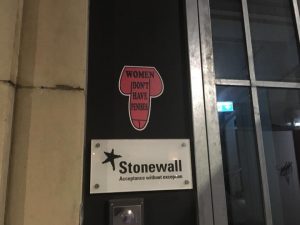
The iconic sticker outside Stonewall headquarters
The stickers peeled off quite easily but technically I think it could be counted as criminal damage; so while at the beginning I didn’t really mind if I got arrested, when I got my court summons that changed.
Now I don’t mind if people know it was me.
“When it took off, lots of women made their own versions, and some transactivists made them too.” She laughs. “I used to leave their ones up if I saw them because I thought they were even more effective than our ones!”

“The penis stickers weren’t effective in some ways; people would take them down even if they didn’t understand what they’re about, because they’re pictures of penises. They’re seen as obscene. They were more for photo ops rather than stickers that would stay up. It’s always important when you’re designing a sticker to keep in mind what it’s for: for photos, for publicity, for outrage. Do you want it to stay up, or change people’s minds? With all campaigning I think it’s important to keep in mind what your objective is.”
 “What really peaks a lot of people is when transactivists say ‘women have penises’. So the stickers were to try to provoke them to say that: because when they say ‘it’s transphobic to say women don’t have penises’… well, 99% of the population think it’s obvious that women don’t have penises!”
“What really peaks a lot of people is when transactivists say ‘women have penises’. So the stickers were to try to provoke them to say that: because when they say ‘it’s transphobic to say women don’t have penises’… well, 99% of the population think it’s obvious that women don’t have penises!”

“There’s still a lot of madness out there.” concluded Venice. “We’ve definitely got a more strong, secure pushback now than we had then. The tide has already turned. When you hear interviewers on TV they seem to be coming from a quite different place now; they’re more challenging. We just have to carry on. Because women don’t have penises.”
How fact became ‘hate speech’
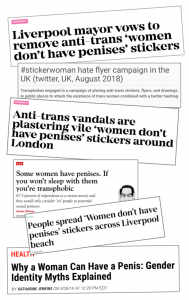

 One thing the campaign certainly did highlight is how easily a simple fact like ‘women don’t have penises’ can become perceived as ‘transphobic’ and how short a step it is from there to the accusation of ‘hate speech’.
One thing the campaign certainly did highlight is how easily a simple fact like ‘women don’t have penises’ can become perceived as ‘transphobic’ and how short a step it is from there to the accusation of ‘hate speech’.

The toilets on busy trains are popular with #stickerwoman
The ‘penis stickers’ were soon being created by women all over the UK. In London, Liverpool, Edinburgh, Manchester, Birmingham and a hundred places above, below and in between, women were printing out the stickers and placing them in public spaces.
Pink penises, green penises, blue penises, big and little, hairy-bollocked or smooth and silky, every one bore the same message. And every woman involved became #stickerwoman.
Not everybody was happy about this. In fact, certain parts of the Twittersphere were raging. The old urban myth of stickers with razor blades under them was rolled out again- and evidently this time it was #stickerwoman who was to blame.
Sweeney Stickerwoman
In September 2018, at the height of #stickerwoman’s activity, a few trans-identified men started ‘warning’ on social media that ‘TERFS’ were hiding razor blades under stickers in the loos of a Manchester train station. Nearly a thousand people retweeted this absurdly unlikely claim, which turned out to be predictably unfounded.



Manchester police rushed to the scene of the public toilets supposedly involved, tweeting as they went.
Nothing was found, although the police didn’t initially respond to enquiries about the result of their search.
“Can you please confirm this was another malicious hoax?” asked one Twitter user.
“How many imaginary razor blades did your officers find in the end?” asked another.
“Did you find any razors behind the stickers?” asked a third. And so on.
“I believe this to be a malicious hoax threat designed to cause distress and anxiety, and to stir up negative public sentiment against women’s rights activists. Can u help?” asked @croneinamillion.
Manchester police remained silent.

In a last ditch attempt to make the accusation stick (geddit?) one person posted a picture of their injured finger –
“When I find the #TERF that put the razor blade behind the #stickerwoman sticker who did this to my finger there will be trouble” posted @shanuvian, alongside the ‘stolen’ picture.
– but a Google Image search by @notmygirl quickly found the picture had come from elsewhere.
Then @shanuvian was found to be a parody account… no wait… the account had been hacked… no wait… it had all been a terrible misunderstanding… and then it was gone.
A Manchester mumsnetter, BettyDuMonde, decided to visit the train station to see what was really going on:

“Had a quick chat with a lovely man on the ticket gates,’ posted Betty after her visit.
“He confirmed that the Transport police attended yesterday evening ‘looking for anti LGBT stickers’ in the toilets. Not only were there no razor blades they didn’t find any ‘anti LGBT’ stickers at all. All toilets were checked, men’s, women’s, disabled and staff.”

Later that evening, Manchester police issued a statement confirming that no razor blades – and no stickers either – had been found. I had a rummage around on Google and, interestingly, no razor blades have ever been proved to have been found under stickers in the UK. It’s just another urban myth and let’s hope it stays that way.

By the time the police disclaimer was issued, the photo and the rumour had been spread all over social media.
Remember – a lie can be halfway round the world before the truth has popped its stickers in its handbag.
As can be seen by this Tweet, below, from nearly two years later.

Penises at sea
 Artist Anthony Gormley’s piece ‘Another Place’ consists of 100 cast iron statues, placed along two miles of beach at Cosby near Liverpool, facing the sea. The statues are modelled on his own body and, as the tides ebb and flow, the naked figures submerge and re-emerge, symbolising the passage of time and the inevitable decay of the artist’s own human body. Pretty cool, eh?
Artist Anthony Gormley’s piece ‘Another Place’ consists of 100 cast iron statues, placed along two miles of beach at Cosby near Liverpool, facing the sea. The statues are modelled on his own body and, as the tides ebb and flow, the naked figures submerge and re-emerge, symbolising the passage of time and the inevitable decay of the artist’s own human body. Pretty cool, eh?
I have never seen them myself, although I do remember when you couldn’t move for Gormleys in the city and I’m still partial to seeing this one (right) peer down at me from the roof of the Roundhouse in Camden.
The penis stickers really captured the attention of the press when #stickerwoman paddled out into the sea at Cosby beach and attached a tiny ‘women don’t have penises’ sticker to one of the statues. Before paddling back to shore, she snapped a picture. This was the result. Can you see it? Look really, really carefully….
The woman was a member of Liverpool Resisters, who tweeted out a picture of the statue with the words ‘1,000 (sic, there are 100) statues, all men. Women don’t have penises’. The press picked up on the pictures and publicity ensued in buckets.

I tracked down the woman who put the sticker there and she agreed to talk to me on the phone. I’ll call her Betsy.
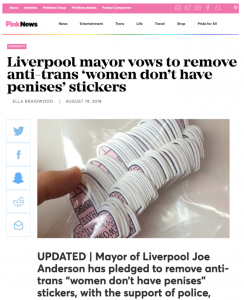 “It blew up a lot more than we expected.” Betsy told me. “We really didn’t expect so much attention. I was tickled by the idea of sticking cartoon penises everywhere. It was just so ‘naughty’! And such a ridiculous thing to have to do in the first place.
“It blew up a lot more than we expected.” Betsy told me. “We really didn’t expect so much attention. I was tickled by the idea of sticking cartoon penises everywhere. It was just so ‘naughty’! And such a ridiculous thing to have to do in the first place.
“Someone redrew the sticker that was put up on Stonewall and created a downloadable file of it. I downloaded that and uploaded it to a sticker company, but I got confused between centimetres and inches when I ordered it, so when they came they were much smaller than I thought they’d be. I distinctly remember thinking, ‘Who is even going to notice these? They’re so tiny!’
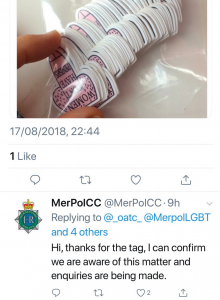 I tweeted the picture from Liverpool Resisters’ Twitter account and it just blew up,” she remembers. “We were reported for hate speech and I hadn’t even opened the packet of stickers yet.”
I tweeted the picture from Liverpool Resisters’ Twitter account and it just blew up,” she remembers. “We were reported for hate speech and I hadn’t even opened the packet of stickers yet.”
“The police said they’d investigate and then the mayor chimed in and said he would assist the police and I had literally not done anything at that point!
On Saturday I took my kids to the beach and I had a sticker on me, so I paddled out to one of the statues that was quite far out- the tide was coming up- and I snapped the picture. Ten minutes later it was covered by the sea.
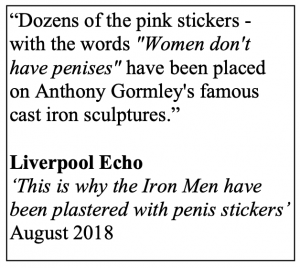 Literally nobody ever saw the sticker, yet the picture went completely viral.”
Literally nobody ever saw the sticker, yet the picture went completely viral.”
Liverpool Echo picked up the story and reported that there were dozens of stickers up and down the beach and that story just got replicated in the media.
“We (Liverpool Resisters) were dealing with a lot of vitriol and it wasn’t anything we were really prepared for,” continued Betsy.
“Pink News even tracked me down and messaged me on my private facebook. We were unprepared for the amount of attention we got. It was kind of like a perfect storm in that we were doing it in that dead zone of reporting, end of August; there’s not much news at that time of year. The experience was very intense and we were being approached by big news outlets.”
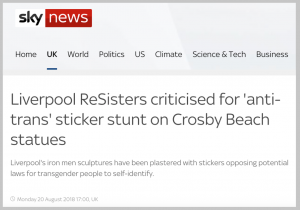 Sky News contacted the Resisters for a statement.
Sky News contacted the Resisters for a statement.
“The sculptures,” ran the article, “have been pasted with phallus-shaped stickers bearing the message ‘women don’t have penises’, by members of Liverpool ReSisters.
“It was a watershed moment,” observed Betsy, as we talked on the phone.
“It was a watershed moment in that you weren’t allowed to talk about this and then suddenly – boom! – everyone’s talking about it.
“It was two years ago now. Looking back on it it was a heady time, it felt wild and exciting: the feeling of being a small cog in a massive machine and all these women pushing in all different ways and not letting up the pressure, contacting their MPs, getting in the press, making noise, making noise… it’s so powerful. There is room for all these different tactics and all these different women have played a part.”
The case led Brendon O’Neil to observe in ‘Spiked‘:
“Is it now a crime to tell the truth in Britain? It’s heading that way. At the weekend it was revealed that Merseyside Police are making ‘enquiries’ into a trans-sceptical group that distributed stickers saying ‘Women don’t have penises’. Yes, that’s right: the police, the actual police, are investigating a group for expressing what the vast majority of people consider to be a biological, social, actual fact: that if you have a penis you are not a female.”

“Only someone who wants to to destroy free thought could say that a sticker that states that a woman is an adult human female is an instrument of a hate crime.” commented one twitter user.
“How can a sticker advocating for women’s sex-based rights be anti–trans? I am genuinely curious.“ asked another.
Some disagreed.
“If you support that anti–trans sticker ‘campaign’ or other action designed to intimidate people who are just living their damn lives then you are a monster who has lost all sense of perspective and decency.“
An important issue raised here is how do we define the phrase ‘anti-trans’? We need discussion around what the phrase actually means. What exactly makes something ‘anti-trans’?
If stating a biological fact is anti-trans, then is biology itself anti-trans?
If defining yourself as same-SEX attracted is anti-trans, then is homosexuality essentially anti-trans?
If standing up for women’s sex-based rights is anti trans, then is feminism inherently anti-trans?
These are big, questions, and I fear they have worryingly obvious answers.
I am #stickerwoman and so’s my wife


The penis stickers took off in a big way and were spotted far and wide. I asked people to send me their photos, and they came in from all over the world! Some of these were sent to me, some were collected on social media.




Penis stickers appeared all over London and the rest of the UK. Stickerwoman’s work was spotted in Copenhagen, New York, Liverpool, Edinburgh and parts of Canada.

One of my favourite versions was slipped to me in the pub after a feminist meeting.
“Have you got a Yoda penis sticker yet? No? Here, have one of mine.”
So cute and adorable, how could I possibly stick him anywhere? I took him home and put him in a box in my feminist filing cabinet, where he has remained until I rummaged around in to find him just now. Here he is!
(Yes, obviously I have a feminist filing cabinet! How on earth do you think I keep track of all this stuff?)
Well, what do you know?
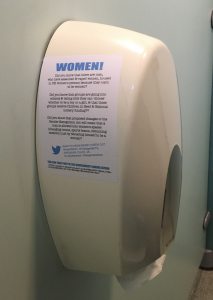 A popular sticker that came out in the second half of 2018 was the ‘Women did you know?’ (WDYK) sticker.
A popular sticker that came out in the second half of 2018 was the ‘Women did you know?’ (WDYK) sticker.
The blue, and probably earliest, version (right) cencouraged the reader to visit the Equalities Office webpage and fill in the government’s consultation on the GRA (Gender Recognition Act). It also gave links to organisations and individuals on Twitter who could help women find out more about the proposed changes to the GRA. The red version was sighted after the consultation closed.
In contrast to the ‘women don’t have penises’ sticker, the WDYK stickers were positively verbose. As such, they were more frequently placed at bus stops, outside cafes and in public toilets on trains and pubs, where the reader might find themselves with a little spare time on their hands.


““Did you know that there are men, who have assaulted and raped women, housed in UK women’s prisons because they claim to be women?” inquires the sticker.
“Did you know that groups are going into schools and telling kids they can ‘choose’ whether to be a boy or a girl, and that these groups receive Children in Need and National Lottery funding?
“Did you know that proposed changes to the Gender Recognition Act will mean that a man is allowed into women’s spaces (changing rooms, sports teams, swimming sessions) just by declaring himself to be a woman?
Every word of the above is true. Protect women’s rights. Say no to self-ID.”
One woman observed that a sticker had sat outside her local Starbucks for four months.
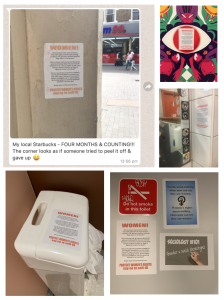
#stickerwoman actions (above) in London, Brighton & Cambridge. Most commonly, the stickers seemed to be placed outside underground stations, at bus stops and in public toilets, on sanitary towel bins, hand dryers and toilet roll dispensers in shopping centres, museums and cafés.

The News Shopper in Kent picked up on the story after a young woman saw stickers in a hospital toilet and told her boyfriend.
“I thought it was just disgusting that we live in a world where people would vandalise medical facilities with such outdated transphobic views.” he told the paper, who obligingly printed the entire text of the stickers online.

Transactivist Sam Feeney posted on Twitter and facebook that neon orange ‘transphobic’ leaflets bearing the same text had been stuck on lampposts in the Cambridgeshire area. Sam, who identifies as a man, posted a video on Twitter.
“I’ll be passing on information to our local hate crime co-ordinator. I’ve actually got the leaflet here & I thought what am I gonna do with it… ideal size really for clearing up me garden. There we go. Handy. So you know what to do with any transphobic leaflets that you find. Make a little shit sandwich.”
I spoke to a woman who had been involved in stickering in her area. She shared the sticker template (above) with me. How did she feel about the fact that some people were upset by them?
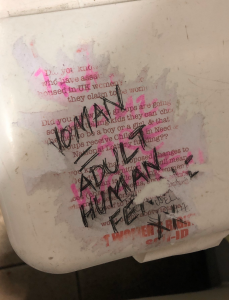
This sticker in a pub (right) has been half torn off, graffitied and a new feminist message scrawled over it in biro.
“We should ask why they were upset by the stickers. Look at the accusations they’re making. ‘Transphobic’ is not the right word to use in a situation like this. Nobody is being mocked, abused or hurt. The leaflet doesn’t even mention trans people. What do the stickers say that is so upsetting? They contain facts. We can look at the points they make one at a time if that helps?
“Did you know that there are men, who have assaulted and raped women, housed in UK women’s prisons because they claim to be women?”
Well, straight off, Karen White is a rapist who was put in a women’s prison and then sexually assaulted women while he was there! Women in prison are at risk, some are really vulnerable, you know, a lot of them have been abused or been in relationships with violent men, they need protection. It happened in America too. They can’t pretend it never happens.

Nobody is saying all trans people or all men are sexually violent, I’ve never heard anyone claim that, it’s crazy to say that’s what we mean. It’s not about hating men. They should be kept safe in men’s prisons. They just shouldn’t be in WOMEN’s safe spaces, how difficult is that?”
Did you know that groups are going into schools and telling kids they can ‘choose’ whether to be a boy or a girl, and that these groups receive Children in Need and National Lottery funding?
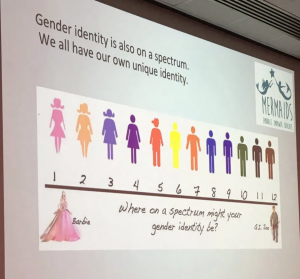 “Again, that’s true. I bet you’ve seen that Mermaids training program resource with the Barbie and the GI Joe, right, where the kid has to choose where their ‘gender identity’ is on the ‘gender spectrum’?
“Again, that’s true. I bet you’ve seen that Mermaids training program resource with the Barbie and the GI Joe, right, where the kid has to choose where their ‘gender identity’ is on the ‘gender spectrum’?
GIRES give schools these lesson plans with cute little trans penguins who tell the kids their parents can’t always tell if they’re a boy or a girl! The kid has to decide when they’re ready.
As for funding, it’s no secret that Mermaids got half a million quid from the Lottery just eighteen months ago! Allsorts run workshops for kids in schools and they get money from Comic Relief. Again, there’s nothing on there (the sticker) that isn’t true.”
Did you know that proposed changes to the Gender Recognition Act will mean that a man is allowed into women’s spaces (changing rooms, sports teams, swimming sessions) just by declaring himself to be a woman?
“It looks as if the government has shelved those plans, at least for now. They couldn’t fail to notice all those women’s campaigns, you know, the Fair Play leafleting campaigns and Posie’s billboard stuff and all the other stuff going on as well. So many! There was so much going on! I really do think the sticker campaigns have played a big part in the turn around, fingers crossed anyway. But if self-ID had happened it would have done exactly what it said on the tin. ANY man could just go into a ladies’ loo or changing room and just say ‘I’m a woman’ and there would be nothing you could do to stop him.
 “So we should be asking why are they calling the stickers transphobic? You say that Sam talked about handing it (the sticker) over to the hate crime squad. The hate crime squad! Why? Where’s the hate? And that guy in the paper talked about ‘outdated transphobic views’.
“So we should be asking why are they calling the stickers transphobic? You say that Sam talked about handing it (the sticker) over to the hate crime squad. The hate crime squad! Why? Where’s the hate? And that guy in the paper talked about ‘outdated transphobic views’.
Is it a hate crime to say that women should have access to single sex spaces? Is it an outdated transphobic view to believe that women need safe spaces? Because if that’s what they’re saying they can fuck off.”
#stickerwoman on the loo (& in the changing rooms)
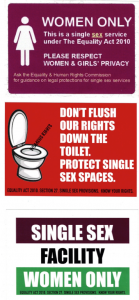 Single sex facilities are supported under the 2010 Equality Act and as such changing rooms and toilets have every right to be designated as single sex areas. In the last few years, a number of different stickers have been produced, by organisations and individuals, drawing women’s attention to the fact that they have a right to expect access to single sex facilities.
Single sex facilities are supported under the 2010 Equality Act and as such changing rooms and toilets have every right to be designated as single sex areas. In the last few years, a number of different stickers have been produced, by organisations and individuals, drawing women’s attention to the fact that they have a right to expect access to single sex facilities.
Some of these (most notably top and bottom right) create an impression of being ‘officiald – and well they might be for they are merely stating details of the Equality Act. This means that they are rarely removed.
“Women Only,” the purple sticker reads. “This is a single sex service under the Equality Act 2010. Please respect women and girls’ privacy. Ask the Equality & Human Rights Commission for guidance on legal protections for single sex services.”
“Don’t flush our rights down the toilet,” declares the red sticker. “Protect single sex spaces. Equality Act 2010. Section 27. Single sex provisions. Know your rights.”
You can purchase these stickers from Standing for Women.

In 2019, Marks and Spencer issued this statement. It was not received as well as they might have expected: when A Woman’s Place published a template for a letter of complaint it was downloaded over 6,000 times, and the Fair Play for Women policy advice on changing rooms was checked out thousands of times.
“Female-only changing rooms are lawful.” advises FPFW. “Department stores CAN choose to exclude all males from female-only changing rooms, irrespective of their gender identity.”


“One day we did a dozen of the Ladies’ loos at Victoria Station,” (with the sticker on the left) one campaigner, who I’ll call Katrina, told me.
“That’s a lot of women reading stickers while they have a wee! And some of them will remember and talk about it to friends or people at work, or take a photo and go home and look it up and realise that, yeah, it’s real, is all really happening.
If the changes to the GRA had happened- which they still might, although fingers crossed they won’t- and self-ID had come in, then yeah, any bloke could just wander into the women’s loos, or changing rooms. I mean, you know, just any pervy bloke who fancied it.
So I never felt guilty about putting the stickers there,” said Katrina. “I felt proud that we did it.”


Adult human #stickerwoman

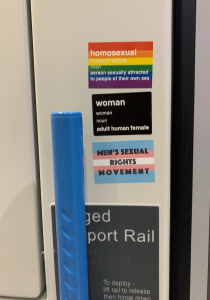 Kellie-Jay Keen-Minshull of Standing for Women, better known as Posie Parker, has been at the forefront of providing stickers to the ‘stickerati’ in the UK and abroad. The ‘adult human female’ (AHF) graphic has been featured on billboards, flags, T shirts, notebooks, pens, and of course stickers throughout the UK and the rest of the world.
Kellie-Jay Keen-Minshull of Standing for Women, better known as Posie Parker, has been at the forefront of providing stickers to the ‘stickerati’ in the UK and abroad. The ‘adult human female’ (AHF) graphic has been featured on billboards, flags, T shirts, notebooks, pens, and of course stickers throughout the UK and the rest of the world.
The absurdity of the double-think at the centre of trans-ideology is highlighted by the fact that this definition is frequently at the centre of controversy about what constitutes ‘hate speech’.

I caught up with Kellie-Jay and asked her about the AHF stickers.
“I thought well, some people might not want to wear a T shirt but they probably would use a sticker. I was thinking more about putting them on toilet doors, you know, just a little act of defiance against any place where they were trying to erase the meaning of the word woman and replace it with ‘anybody who says they are’.
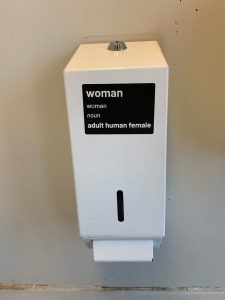 The beauty of the stickers is that people feel like they’re participating. If they can’t speak out at work, or if they don’t feel that their friends are interested, or they think their friends are going to vilify them for accepting that biological sex is a material reality then it gives them a space in which they can express themselves and not lose their minds.
The beauty of the stickers is that people feel like they’re participating. If they can’t speak out at work, or if they don’t feel that their friends are interested, or they think their friends are going to vilify them for accepting that biological sex is a material reality then it gives them a space in which they can express themselves and not lose their minds.
I think the gaslighting of telling women that we are not allowed to say women are adult human females has the potential to do huge psychological harm to all of us, especially en masse.
So the stickers are about being able to express yourself, if not in all areas of your life, at least in this particular act of defiance.”
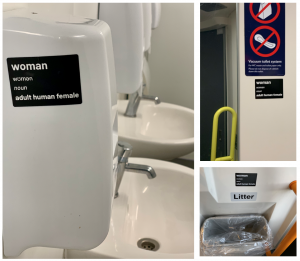 AHF stickers have been spotted all over the world. Locations outside the UK include Amsterdam, Geneva, Hollywood, a Missouri gas station and a lesbian bar in New York. They can be purchased from Standing for Women.
AHF stickers have been spotted all over the world. Locations outside the UK include Amsterdam, Geneva, Hollywood, a Missouri gas station and a lesbian bar in New York. They can be purchased from Standing for Women.

#stickerwoman goes to Oxford
“You should write about what happened in Oxford last year,” advised a Twitter mutual. “I know the woman who put those up. I could ask her to contact you if you like?”
In 2019, there was another burst of media attention for #stickerwoman, after stickers were spotted in Oxford.

Over a period of months, #stickerwoman’s works had been sighted in several areas of the city centre.
“Thames Valley Police is investigating and appealing for witnesses following the offences.” warned the Oxford Mail in October 2019.
“We take incidents of this nature very seriously,” PC Rebecca Nightingale told the Mail.

The Telegraph called the police response ‘extraordinary’ and Michael Biggs, Associate Professor in Sociology at the University of Oxford, agreed, observing, “to say that a dictionary definition is a terrible hate crime is extraordinary.”
There seemed to be some sort of ambiguity about what exactly the police were investigating. The article celebrated the response of ‘dedicated activists’ who had decided to ‘fight back’ by putting up their own stickers bearing slogans such as ‘trans joy is real’ and ‘trans women are real women’. Were they to be investigated too?
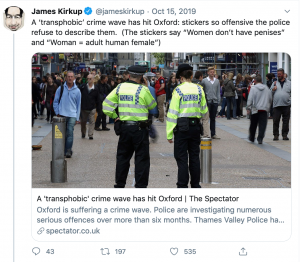 ‘I think there should be mandatory education around trans issues rather than fining (sic) people.” Zayna Ratty, chair of Oxford Pride, told the Mail.
‘I think there should be mandatory education around trans issues rather than fining (sic) people.” Zayna Ratty, chair of Oxford Pride, told the Mail.
Wait… what… you want women who put up stickers with the dictionary definition of ‘woman’ on them to be forcibly re-educated???
The woman who put up the stickers did get in touch with me.
She told me, “I did it because of the silence and because I felt helpless. “
#Stickerwoman don’t want a job in Starbucks
 “Mermaids is delighted to announce that we have partnered with speciality coffee retailer Starbucks for their new #WhatsYourName campaign,” announced Mermaids back in February 2020.
“Mermaids is delighted to announce that we have partnered with speciality coffee retailer Starbucks for their new #WhatsYourName campaign,” announced Mermaids back in February 2020.
For a limited edition Mermaids cookies were sold in selected stores across the UK and 50p from each cookie sold went towards funding Mermaids helpline services. Starbucks committed to paying a minimum of £100,000 to Mermaids for the partnership. The #WhatsYourName campaign involved heartwarming videos of trans people visiting Starbucks and finding warmth and affirmation in having their chosen names called out and written on their coffee cups.
 “So sweet. So innocent. Or sickening. Depending what you know.” wrote Douglas Murray in the Telegraph back in February. Murray views Mermaids as “…one of the most sinister charitable organisations in the UK… everything that Mermaids pushes is deeply controversial and with implications which need to be properly interrogated”.
“So sweet. So innocent. Or sickening. Depending what you know.” wrote Douglas Murray in the Telegraph back in February. Murray views Mermaids as “…one of the most sinister charitable organisations in the UK… everything that Mermaids pushes is deeply controversial and with implications which need to be properly interrogated”.
Concerns have been expressed for many years about the objectivity of Mermaids, whose own CEO took her trans-identified child abroad to undergo a penectomy on his 16th birthday.  Mermaids’ use of sweets and cute dogs to promote its services to young people on social media have made many feel uncomfortable, as have its attitudes to safeguarding. Mermaids advocate for children to be allowed to ‘change gender’ at school without parental consent and for fewer restrictions surrounding trans-identifed children’s access to puberty blockers, hormone therapy and surgery. Some suggest that Mermaids are complicit in the ‘trans away the gay’ school of thought.
Mermaids’ use of sweets and cute dogs to promote its services to young people on social media have made many feel uncomfortable, as have its attitudes to safeguarding. Mermaids advocate for children to be allowed to ‘change gender’ at school without parental consent and for fewer restrictions surrounding trans-identifed children’s access to puberty blockers, hormone therapy and surgery. Some suggest that Mermaids are complicit in the ‘trans away the gay’ school of thought.
“The fact that multinationals like Starbucks can so easily jump on board with the agenda that Mermaids is pushing is just the latest demonstration of how fast this new orthodoxy is being accepted.” observes Murray.
Enter #stickerwoman!
I tracked down Joyce and Lucy (not their real names) who were behind the Starbucks campaign stickers and asked them how they came up with the idea.
 “Initially I researched cups,” Joyce told me. “I was going to make something that was like a Starbucks cup, or buy some cups and put stickers on them because getting cups printed up is really expensive. I was at one point considering making little cups with stickers on and standing outside Starbucks, giving them out, telling people Starbucks were giving away free samples today. You give someone a cup and it says ‘transitioning children is child abuse’ or whatever and they take it into the store … but I decided not to do that in the end. I just really wanted it to create a massive inconvenience for Starbucks and hopefully create a news story in itself.
“Initially I researched cups,” Joyce told me. “I was going to make something that was like a Starbucks cup, or buy some cups and put stickers on them because getting cups printed up is really expensive. I was at one point considering making little cups with stickers on and standing outside Starbucks, giving them out, telling people Starbucks were giving away free samples today. You give someone a cup and it says ‘transitioning children is child abuse’ or whatever and they take it into the store … but I decided not to do that in the end. I just really wanted it to create a massive inconvenience for Starbucks and hopefully create a news story in itself.
Then I was thinking about stickers and talking to Amber about it and she said, ‘Oh, Lucy’s also been talking about doing something with this, designing stickers,” and she put us in touch. So we talked about how to approach it. Lucy pointed out how litigious Starbucks are and how we needed to be really careful.”
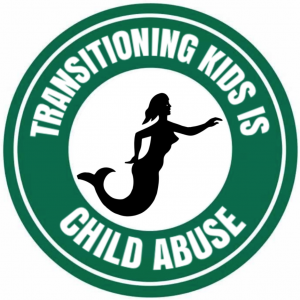
The final design
We had to be careful with the design,” said Lucy, “because obviously it couldn’t have anything directly to do with Starbucks. Joyce came up with a design at first and it was great, really blunt and to the point but I was like, ‘oh my god, we can’t say that! We can’t use that logo!’

So we compromised a bit with the design in the end. Joyce knew a good place to get them (the stickers) printed up and then we got them out to people who wanted them and they passed them on- and in the end they ended up everywhere!
The press didn’t pick up on it at all though which was a shame, and then it all came to a stop with lockdown. There are some great photos about though. And I do think the campaign did a lot to raise awareness about some of the concerns with that alliance.”
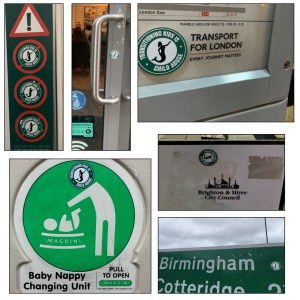
#stickerwoman: London, Birmingham, Brighton
“Of course, we didn’t tell people what they should do with the stickers,” concluded Joyce, “but strangely enough, they just seemed to work it out for themselves.”

#stickerwoman in prison

“When I started my campaign ‘Keep Prisons Single Sex’ (KPSS) one of the first things I though of was how to capture the essence of what I am trying to do in a sticker. I hope I have succeeded!”
Kate emailed me last week to let me know that KPSS would be starting a twitter account shortly: @NoXYinXXprisons

“Stickering is an important part of the campaign. It’s something that women can easily do to get the message out. It’s a way to be involved which doesn’t have to take up much time, and that can be anonymous.
Of course, when stickers are photographed and these images are tweeted or circulated on social media, the impact is magnified. Women have always been very creative in where they sticker to make the message even clearer.
JK Stickerwoman

not from the books, or by JKR
Unless you’ve been living under a rock for the last few weeks, you can hardly have failed to be aware of JK Rowling’s recent tweets and the barrage of threats and abuse she has received since coming out in support of women’s sex-based rights.
Rather than repeat the entire saga, I refer you to Rowling’s website where she explains her position.
The social media version of the story is perfectly summed up in Rebecca Reilly-Cooper’s excellent ‘JK Rowling & the Transactivists: a story in screenshots’.
A selection of articles from the Independent are here. A quick Google will throw up numerous pieces by traumatised millennials: don’t miss this classic from Marie Claire suggesting in all seriousness that “we should consider shutting down ‘Cursed Child’ and Harry Potter theme parks”.
Needless to say, #stickerwoman was quick to show her support and approval when Standing for Women released these stickers.


#Stickerwoman must also have contacted @erinnyes on Twitter, who sent her some of her own stickers (payment via paypal) for £2.50 for ten, plus a pound postage.
We are all #stickerwoman – stories from the front line
#stickerwoman says
 #Stickerwoman Does Pride!
#Stickerwoman Does Pride!
As a lesbian, I’d once have been thrilled that my office was on London’s Pride route. But now the rainbow flag just means homophobia – and it was EVERYWHERE. Watching me get increasingly stressed, my friend had an idea.
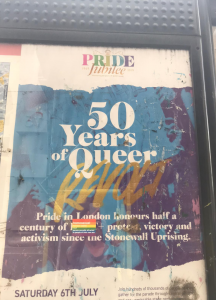 The night before the march, we covered the route in stickers and leaflets. People paid minimal attention to us – just a couple of middle-aged women – and if they did, a wave of a rainbow sticker with a cheery “Pride!” was normally all it took.
The night before the march, we covered the route in stickers and leaflets. People paid minimal attention to us – just a couple of middle-aged women – and if they did, a wave of a rainbow sticker with a cheery “Pride!” was normally all it took.
We finished by slipping a load of leaflets into the big tent in Trafalgar Square, waiting until the guard was out of sight for long enough not to notice.
By the time we’d finished, tired but very pleased with ourselves, it was impossible to miss that Stickerwoman had done Pride.

We watched Twitter the next day with interest. My favourite comment was from someone who moaned, “there were TERF stickers everywhere. And when I pulled one down it started raining!”
#stickerwoman says
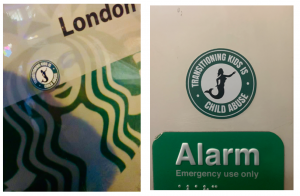 Why do I sticker? Because the weight of well financed institutions such as Mermaids and the way they are able to affect police, government and school policy needs to be counterbalanced with a few cold, hard facts here and there. ( I can’t afford an advertising campaign. So…)
Why do I sticker? Because the weight of well financed institutions such as Mermaids and the way they are able to affect police, government and school policy needs to be counterbalanced with a few cold, hard facts here and there. ( I can’t afford an advertising campaign. So…)
#stickerwoman says
July 2020

#stickerwoman says
Hi Lily.
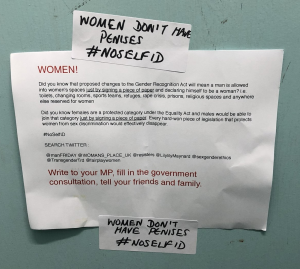 Here is my first sticker(s) I used summer 2018. I put them on the back of women’s public toilet cubicle doors during one of the countries major Folk Festivals. I did it every day. I printed and wrote them myself. I took the text from a Mumsnet (Nuttersnet! LOL) post.
Here is my first sticker(s) I used summer 2018. I put them on the back of women’s public toilet cubicle doors during one of the countries major Folk Festivals. I did it every day. I printed and wrote them myself. I took the text from a Mumsnet (Nuttersnet! LOL) post.
Then luckily Posie Parker did some decent ones and I continue to put stickers on the back of every toilet cubicle door I go in – Adult Human female ones.
I also have a stash of Fair Play Leaflets that I stick to the door too. I do my local public toilets as does my local Terven friend. I’ve also done a few bus stops in my home town and also I left AHF stickers on various poles, electricity boxes etc around local towns too. Some stayed for months before being removed. I wish I could sticker more! I don’t go out much!
I’ve encouraged a few of my milder, less adventurous friends to sticker loos too: no one can see it’s you. And I always put them so that when she’s sat down, the woman will see the sticker even if her bag is hung up on the hook behind the door. See, I’ve put a lot of thought into this! And of course, any rustling noise of stickers coming out : other women just think you’re on your period!
#stickerwoman says

“Hey. When all of you in the UK started putting up the penis sticker, I got inspired to do stickers on radfem topics for Copenhagen. (This sticker) says “Kiss my girldick or get slapped”. A transwoman said that to a Danish bisexual woman. (These say) “there are only two” and “snowflakes cannot carry the flame of revolution”. I don’t know if you can use any of this. But there you go.”

Whilst stickering in the UK could, in certain circumstances, be construed as criminal damage, in China it seems you only have to think about it to get arrested, as the following story of artist Li Maizi shows.
#stickerwoman in China
In 2015 in China, five women’s rights activists were arrested, accused of planning a ‘multi-city protest’ on International Women’s Day. The activists had intended to draw attention to the issue of sexual harassment on public transport by distributing stickers on buses with slogans such as “Police: go arrest those who committed sexual harassment”.
A friend of the protestors observed “…it’s not at all in violation of the law, nor is it disturbing public order, let alone the fact that those plans did not happen.”
A lawyer for the women was quoted as saying, “I think what they have done or were planning to do deserves to be praised rather than punished.”

Li Maizi was arrested
Artist Li Maizi, a lesbian feminist with a history of activism, was one of these women. In 2012, she and two other women walked down a shopping street in Beijing wearing ‘blood-spattered’ wedding dresses to raise awareness of domestic violence. She was also involved in the ‘Occupy Mens Room’ protest against inadequate public toilet provision for women.
For her part in the sticker action that never happened, Li Maizi was questioned non-stop for 24 hours and detained for 37 days.
“Feminism is my soul.” she said on her release.
Whither #stickerwoman?


You can read the ReSisters article about their sticker campaign for World Toilet Day, ‘Flushing Female Loo Provision Down The Bog‘, here.
If you’d like to make your own stickers, to decorate your car or notebooks for example, there is a dropbox here and another here where you can download printable stickers.

You can buy a variety of high quality stickers from Standing for Women.
You can buy sticker paper that will run comfortably through your own printer, on Amazon, here. These labels are A6, four to a sheet. Other sizes are available.
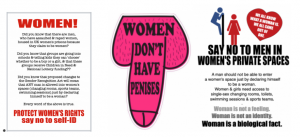 The women who made these designs (right) are happy for them to be shared. If you’d like to print them out to put on bookmarks, birthday cards or anywhere else, you can screenshot the larger versions in this article with their blessing.
The women who made these designs (right) are happy for them to be shared. If you’d like to print them out to put on bookmarks, birthday cards or anywhere else, you can screenshot the larger versions in this article with their blessing.
Or just use some felt tips and your imagination.
And finally… some random sticker pictures which didn’t get fitted in anywhere else…





P.S.
#Stickerwoman Updates 2020
If you keep sending me pictures of stickers that you see out and about, I’ll add some of them here:
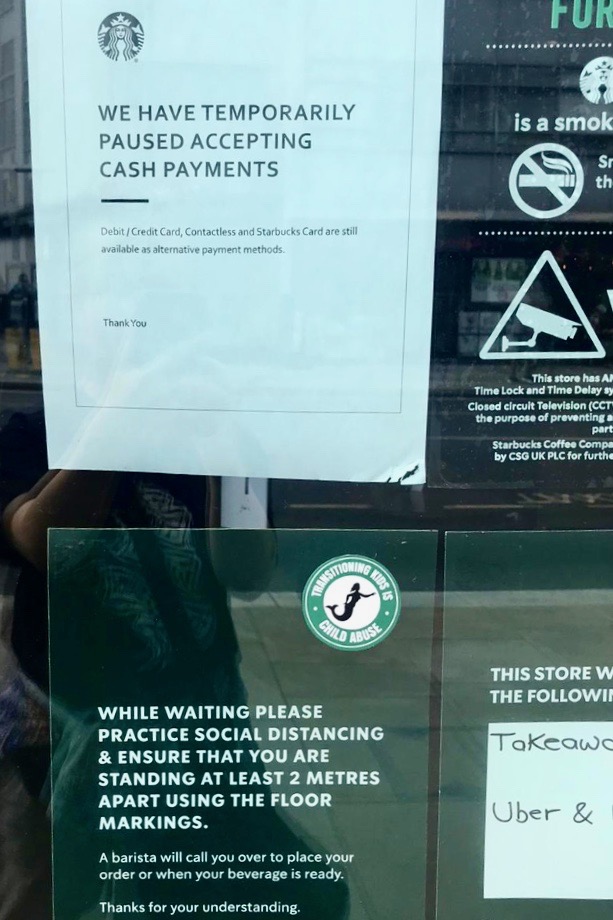
Richmond, July 2020

Below: December 2020, before & after photos taken in Wisconsin, USA, as reported by Women’s Liberation Radio News on Facebook.
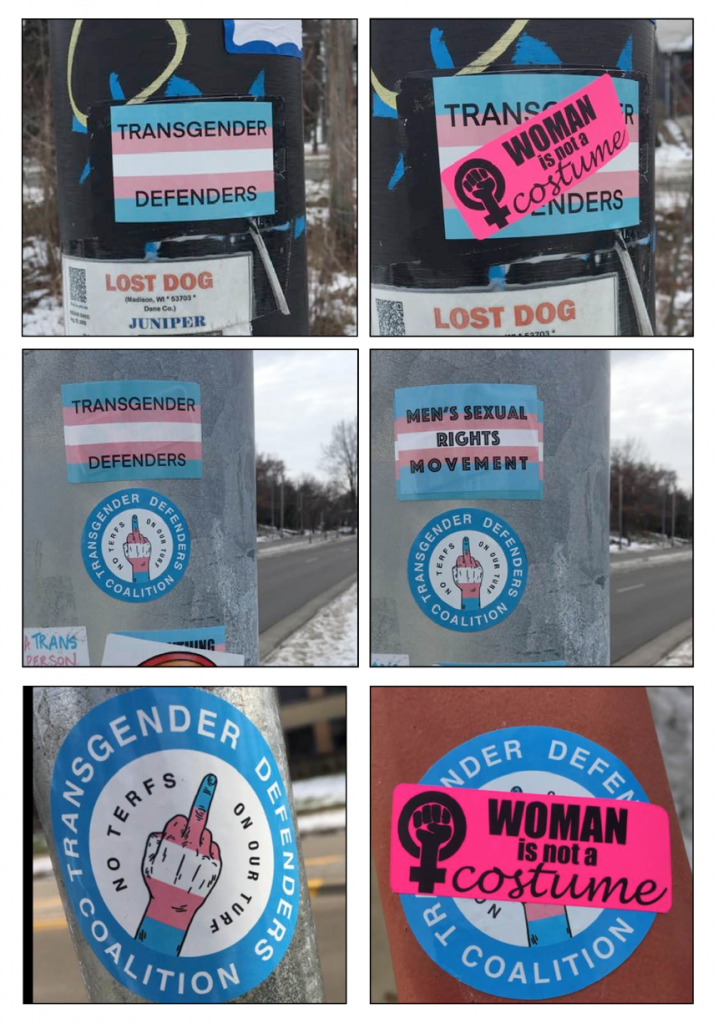
#Stickerwoman Updates 2021
I’m sharing just a couple of new stickers from this year so far: this one from Scotland, where the police seemed especially concerned about this sticker– so much so that they tweeted about it. Their tweet was later removed.
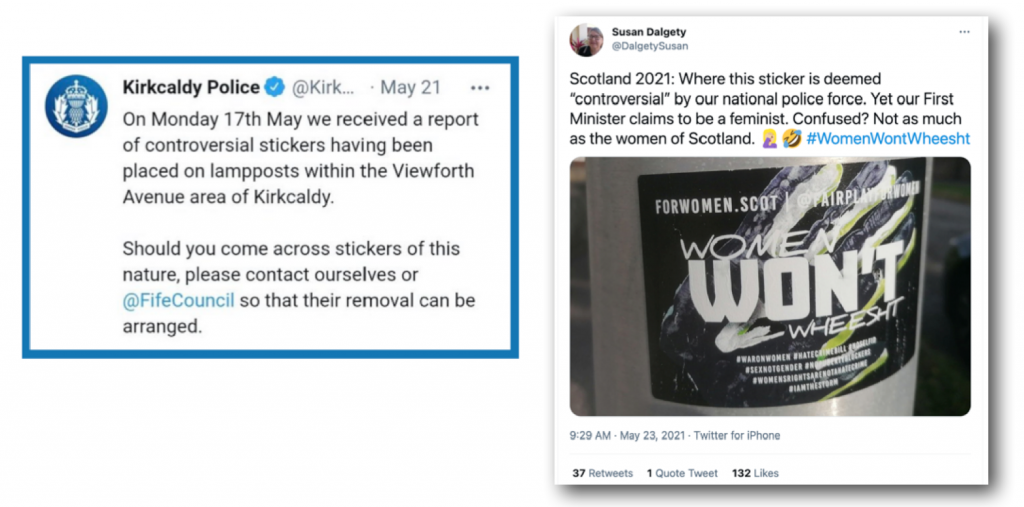
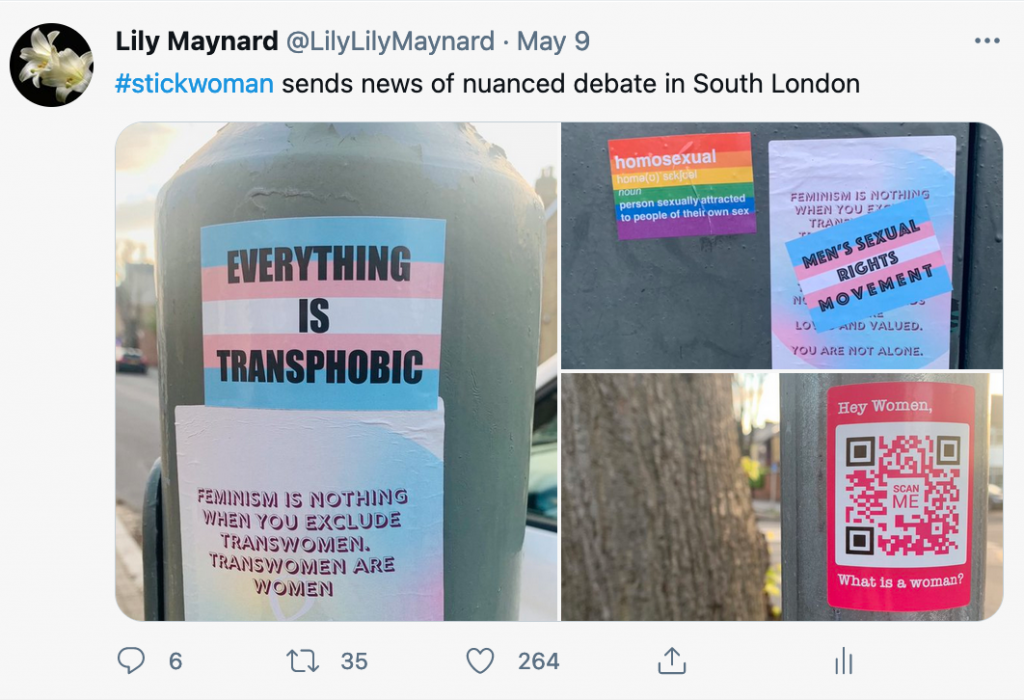
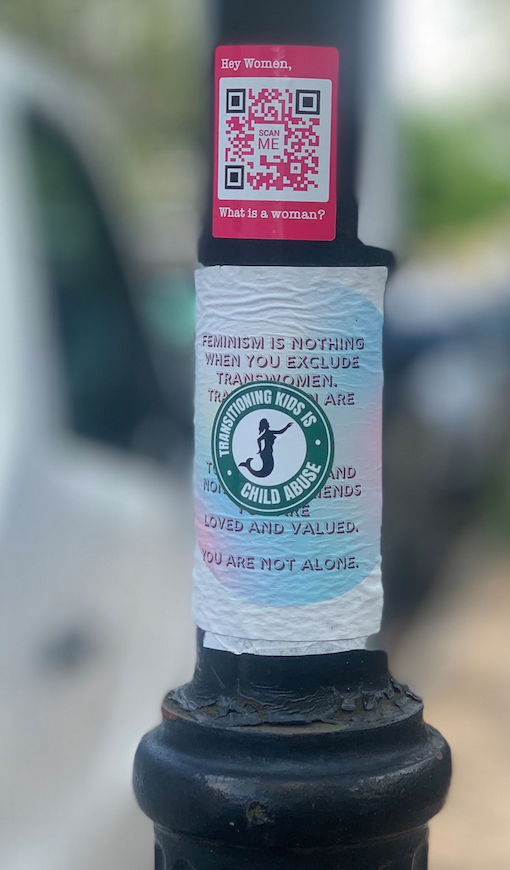 In south London, there has been some to-and-fro stickering between stickerwoman and some locals who believe feminism should include men.
In south London, there has been some to-and-fro stickering between stickerwoman and some locals who believe feminism should include men.
This response (left) includes Kellie-Jay’s latest inspiration: a bar code that can be scanned and takes you to the Standing for Women website. More of these have been spotted in central London.
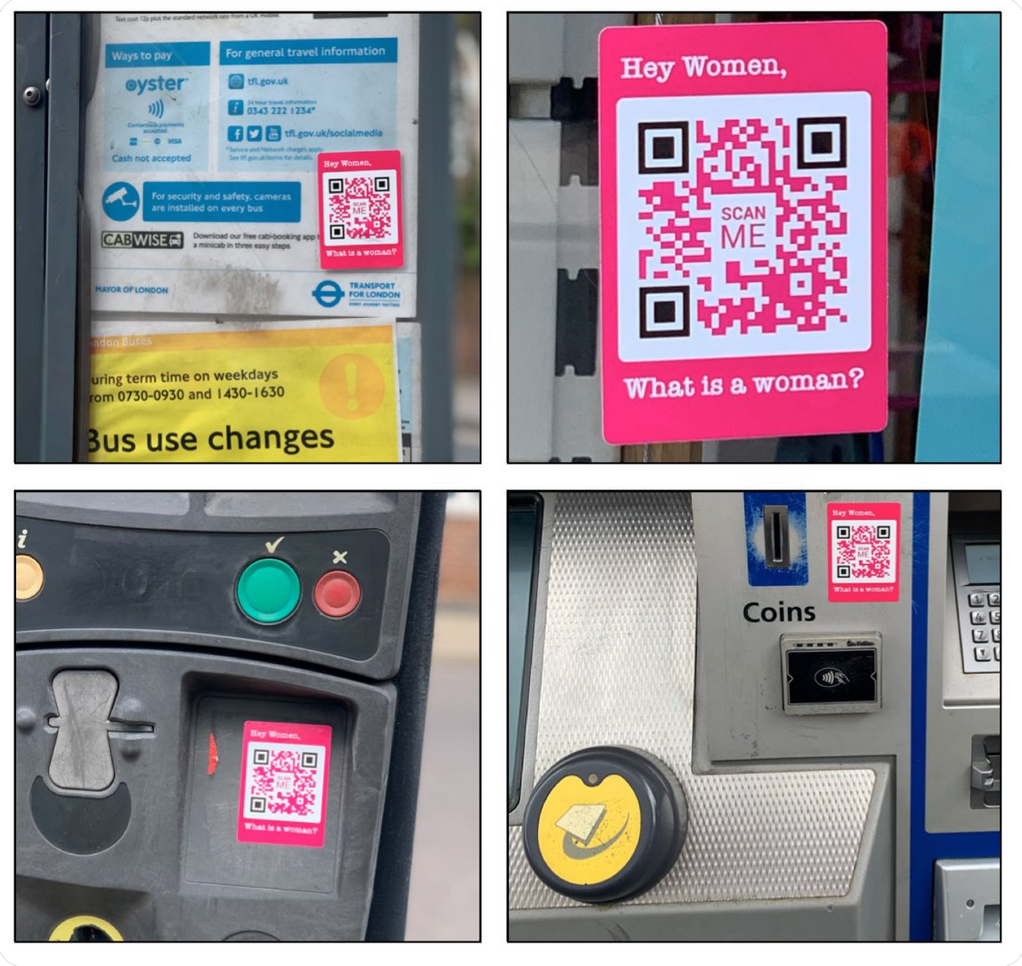
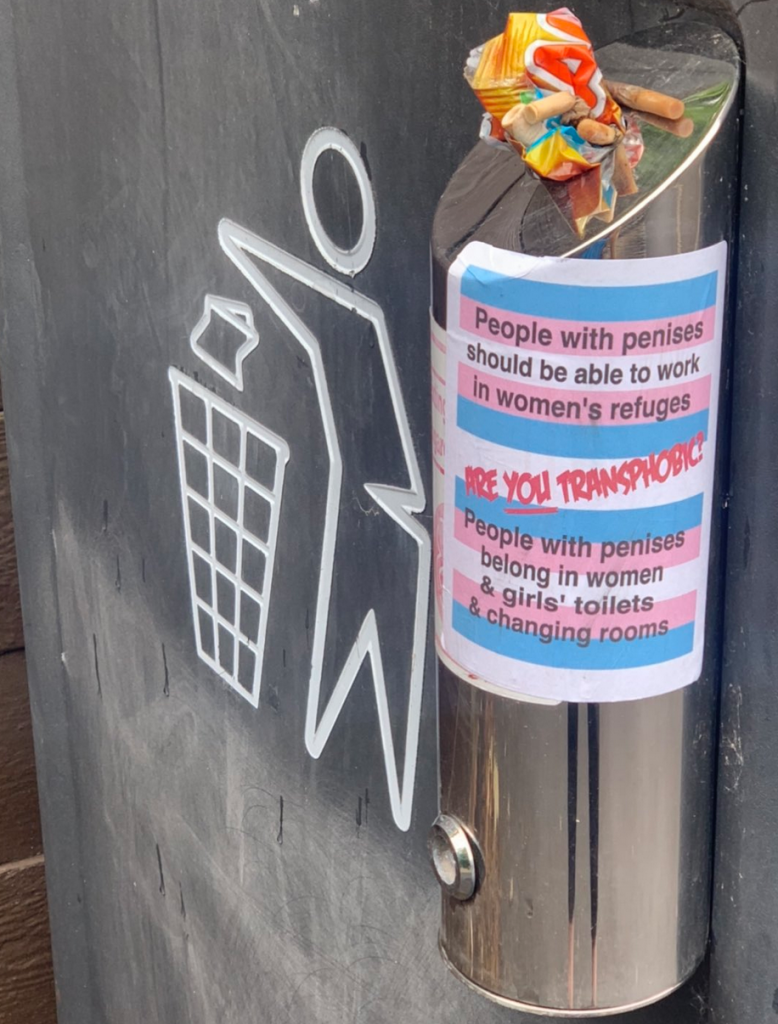 This is a sticker I haven’t seen before (right). It was sent to me by a stickerwoman so was obviously created ironically but may make passers by think about the IRL implications of self-ID.
This is a sticker I haven’t seen before (right). It was sent to me by a stickerwoman so was obviously created ironically but may make passers by think about the IRL implications of self-ID.
It reads “people with penises should be able to work in women’s refuges. Are you transphobic? People with penises belong in women & girls’ toilets & changing rooms”

In recent elections for the London Assembly, Stickerwoman made no secret of her feelings, adding a sticker reading ‘keep prisons single sex’ and writing ‘women deserve single sex spaces’ on her paper.

In April, #stickerwoman was busy in public toilets in Madrid, warning women & girls that sexual assaults are 9 times more likely to happen in mixed-sex spaces.
The lockdowns associated with COVID over the last year have meant that Stickerwomen all over the country have been out less than usual, but these gems from around London and Brighton show that some Stickerwomen are ever alert.
Interesting to see an anti-mask sticker also using the Starbucks logo.
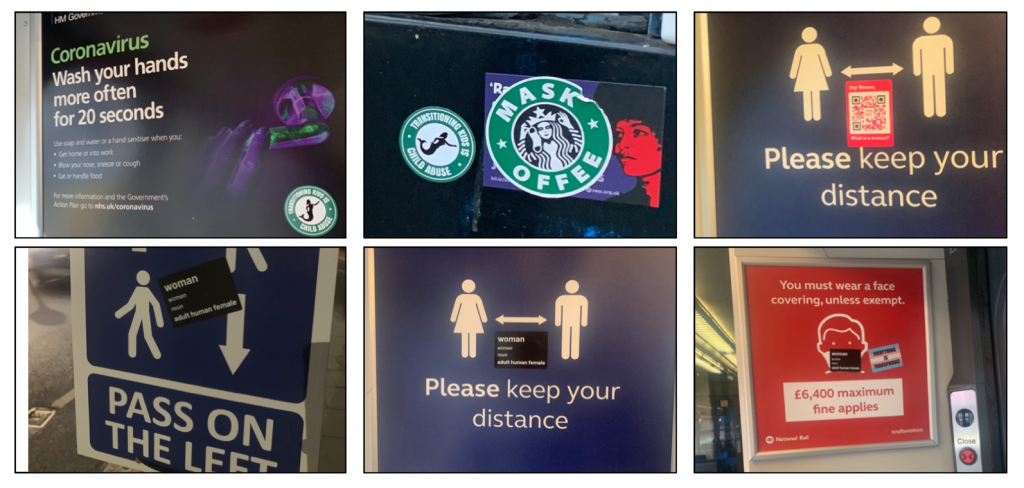
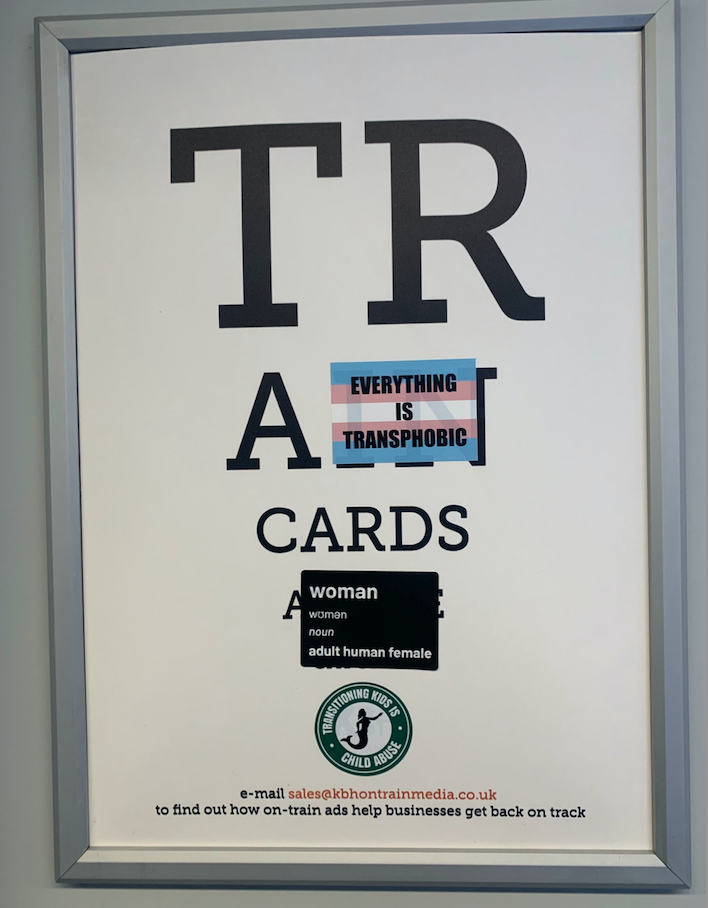
One of my recent favourites, taken on a Kent train. Not a new sticker, but I’ve included it because it’s clever how stickerwoman has covered up the last letters of ‘trains’ to leave TRA (trans rights activist) showing next to the words ‘everything is transphobic’.
Stickerwoman has recently been spotted in Ireland, leaving stickers in the city of Dublin and in the seaport of Waterford, Ireland’s oldest city (below).
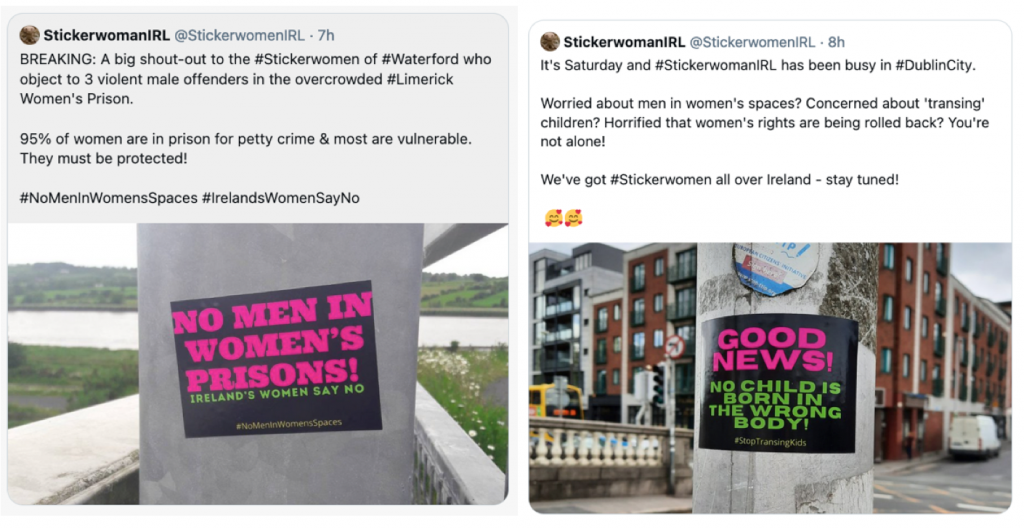
Keep sending me your stickers pictures, ideally with location, & I’ll add some of them here. Power to all those stickerwomen out there!


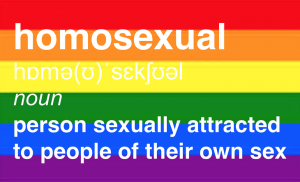 #Stickerwoman Does Pride!
#Stickerwoman Does Pride!
This is just a brilliant case study of one kind of organizing which draws attention to a major problem which no one in the well-funded press was willing to acknowledge. I used to teach classes in social movements, and I wish I’d had such sterling modern examples. I was following the sticker campaign from the “front” (what people wrote about it generally) and it’s wonderful to get the bigger picture. I commend your work.
could you put a zip of all the stickers up for download please?
Not sure how I’d do that. I’ll speak to somebody more ‘techy’ & do it if I can, it’s a great idea.
Pingback: Counting the COSTA - the glorification of cutting off healthy breasts -Lily Maynard